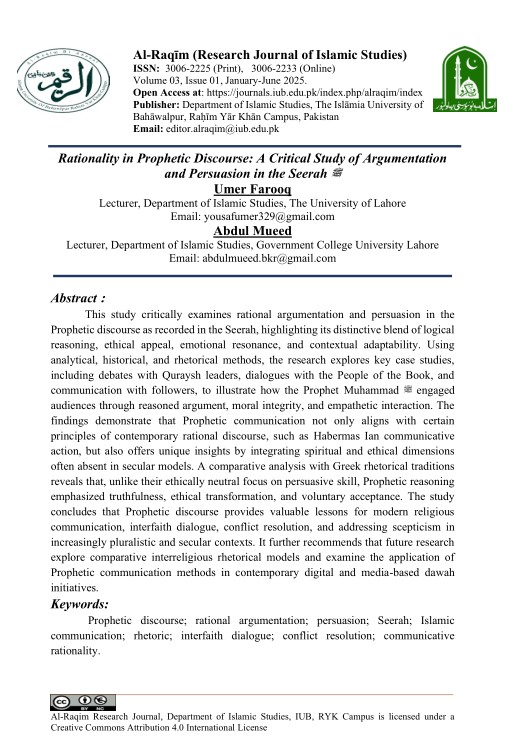Rationality in Prophetic Discourse: A Critical Study of Argumentation and Persuasion in the Seerah ﷺ
Keywords:
Prophetic discourse; rational argumentation; persuasion; Seerah; Islamic communication; rhetoric; interfaith dialogue; conflict resolution; communicative rationality.Abstract
This study critically examines rational argumentation and persuasion in the Prophetic discourse as recorded in the Seerah, highlighting its distinctive blend of logical reasoning, ethical appeal, emotional resonance, and contextual adaptability. Using analytical, historical, and rhetorical methods, the research explores key case studies, including debates with Quraysh leaders, dialogues with the People of the Book, and communication with followers, to illustrate how the Prophet Muhammad ﷺ engaged audiences through reasoned argument, moral integrity, and empathetic interaction. The findings demonstrate that Prophetic communication not only aligns with certain principles of contemporary rational discourse, such as Habermas Ian communicative action, but also offers unique insights by integrating spiritual and ethical dimensions often absent in secular models. A comparative analysis with Greek rhetorical traditions reveals that, unlike their ethically neutral focus on persuasive skill, Prophetic reasoning emphasized truthfulness, ethical transformation, and voluntary acceptance. The study concludes that Prophetic discourse provides valuable lessons for modern religious communication, interfaith dialogue, conflict resolution, and addressing scepticism in increasingly pluralistic and secular contexts. It further recommends that future research explore comparative interreligious rhetorical models and examine the application of Prophetic communication methods in contemporary digital and media-based dawah initiatives.

Downloads
Published
Issue
Section
License
Copyright (c) 2025 Umer Farooq, Abdul Mueed

This work is licensed under a Creative Commons Attribution-NonCommercial 4.0 International License.




